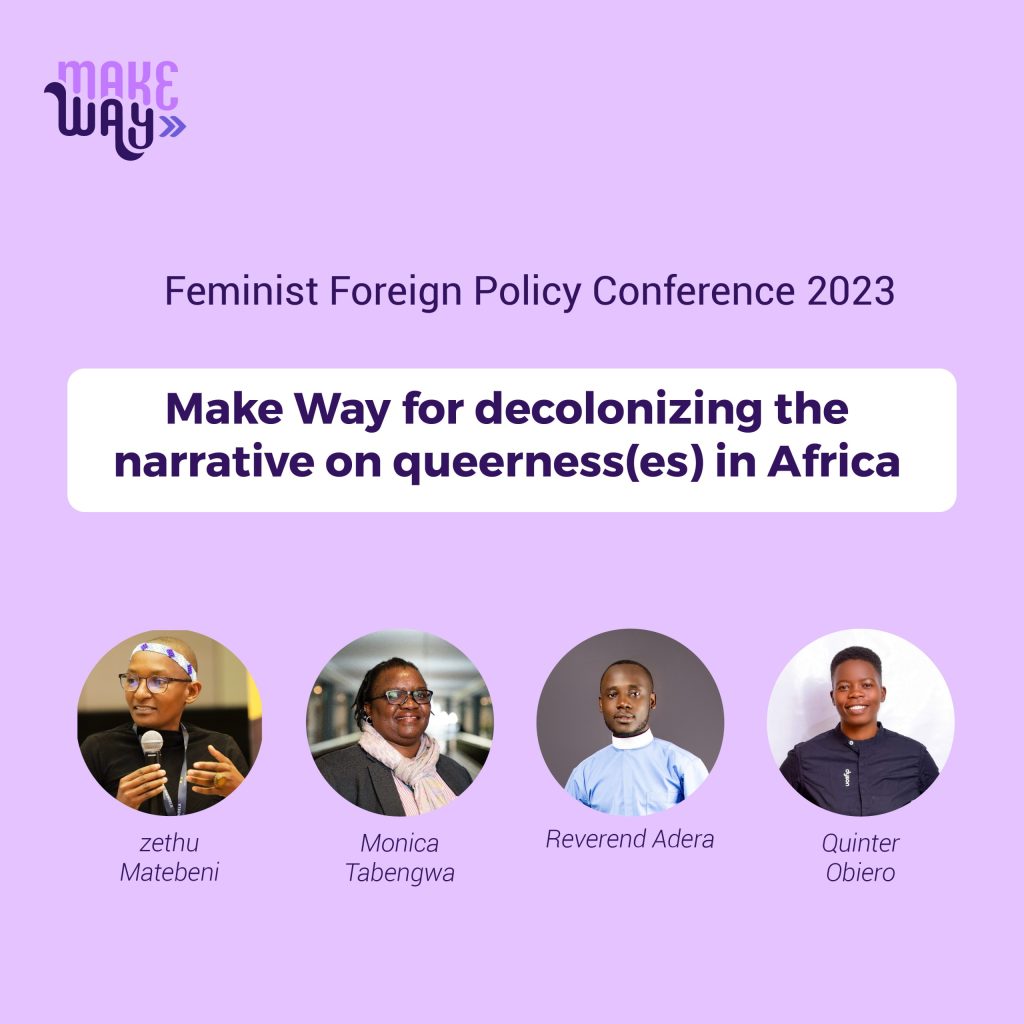Make Way at the Shaping Feminist Foreign Policy Conference: Decolonising the narrative on queerness(es) in Africa
 25 October 2023
25 October 2023

We are delighted to host the session ‘Decolonising the narrative on queerness(es) in Africa’ at the Shaping Feminist Foreign Policy Conference 2023 on November 1st in the Hague, Netherlands. The session will explore ways to unpack and decolonise the conversations about queerness and its different forms in Africa.
The session comes at a critical time as we witness the civic space decreasing, especially with the passing of the anti-homosexuality legislation in Uganda. This is not an isolated phenomenon, with similar anti-LGBTQ+ movements and developments in Kenya, Ghana and Nigeria, as well as globally. Together, we will explore ways forward to achieving social justice and in particular, safeguarding LGBTQ+ rights.
Shaping Feminist Foreign Policy Conference
The Shaping Feminist Foreign Policy Conference is a pivotal platform fortifying the Netherlands commitment to feminist foreign policy. It places importance on universal equal rights, specifically emphasising women, LGBTQ+ people and other marginalised groups. As Make Way, we actively influence the feminist foreign policy, through advocating for an intersectional, feminist and decolonised approach towards social justice for the LGBTQ+ community that respects the religious, cultural and historical contexts. Our session was one of the final dozen thematic sessions selected for the Shaping Feminist Foreign Policy Conference from over 170 applications.
Make Way
The Make Way programme trailblazes intersectionality within sexual and reproductive health and rights (SRHR) (advocacy) – ensuring that no one is left behind. Make Way aims to break down barriers to SRHR by promoting the use of an intersectional lens. This means looking at the effects of overlapping forms of vulnerabilities, for example those relating to gender, religion, ability, ethnicity or social status. Applying this lens uncovers power dynamics, plus interrelated and systemic barriers that prevent minoritised people, especially youth, from realising their SRHR.
In the past year, conversations around the risk management of our work centralised around two main questions:
- How can we speak about LGBTQ+ in our contexts in a safer way, to do no harm and ensure the safety of primary actors, our partners and staff members?
- How can we counterbalance the opposition (anti-rights/gender/LGBTQ+ movements) with effective messaging and influence the moveable middle in African communities?
The above questions led to meaningful conversations within the consortium. In the Shaping Feminist Foreign Policy Conference, we will continue this conversation with a diverse panel of experts from the LGBTQ+ space.
Decolonising the narrative on queerness(es) in Africa
Through storytelling, panel discussions and question rounds, we will jump into decolonising the narrative on queerness(es) in Africa. Together with our expert panel, we will examine the history and the role of religion and tradition on the discussions and attitudes surrounding LGBTQ+ people in Africa. In addition, we will look into how to decolonise the narrative on queerness(es) in Africa, provoke discussion about the western approach to LGBTQ+ and its (un)intended negative effects. Furthermore, we will explore ways forward to achieve social justice and dismantle the siloed approach to achieving civil and political rights.
Introducing our panel
We are joined by experts from across different countries in East and Southern Africa who will take us on a journey of exploration of the history, role and impact of religion and tradition on attitudes surrounding LGBTQ+ on the continent.
Quinter Obiero is a passionate young queer individual who actively advocates for the rights of the sexual and gender minority groups in Kenya, with a strong focus on SRHR. As a committed member of the Make Way Youth Panel, Obiero actively engages in creating awareness, advocating for policy change and empowering marginalised communities.
Prof. zethu Matebeni is a Professor of Sociology and African queer studies and the South Africa Research Chair in Sexualities, Genders & Queer Studies at the University of Fort Hare, visiting Professor at the Women’s Gender & Sexualities Studies Department at Yale University and the Marie Jahoda Professorial Fellow at Ruhr University Bochum.
Reverend Adera is a Theologian, an ordained minister in the Anglican church of Kenya and a pastor serving at the Cosmopolitan Affirming Church (CAC) in Nairobi. Rev. Adera is also a PhD candidate with the Circle of Concerned African Women Theologians studying the intersection of theology, gender and sexuality.
Monica Tabengwa is a Policy Specialist with the Inclusive Governance Initiative project at the United Nations Development Programme Africa, a human rights lawyer, activist and feminist, with extensive experience in human rights and social justice advocacy. Monica is also the former Executive Director of Pan Africa International Lesbian, Gay, Bisexual, Trans and Intersex Association (ILGA) and a founder of two LGBTQ+ organisations.
Beyond, the panel members, the session will also be hosted by regional and global experts.
Felicity Sibindi is a public health practitioner, African feminist and women’s rights activist, with experience across the African continent in primary health care service-provision, feminist movement-building and advocacy. Working as senior program manager for Make Way at VSO (Voluntary Service Overseas) Netherlands, her work focuses on the intersection of issues affecting women and vulnerable communities.
Sietse Blom is a political economist with a background in lobby and advocacy, partnership management and development cooperation. He has experience in the fields of enhancing educational quality, youth employment opportunities, public-private cooperation and intersectional SRHR. He currently works as Team Lead Strategic Partnerships at VSO Netherlands and is actively involved in the Make Way programme.
Curious to learn more?
The Shaping Feminist Foreign Policy Conference is a closed-event; however, we will record a separate round-table discussion with the panellists to be published for the public. Please stay up to date on our Make Way channels for the latest developments!



